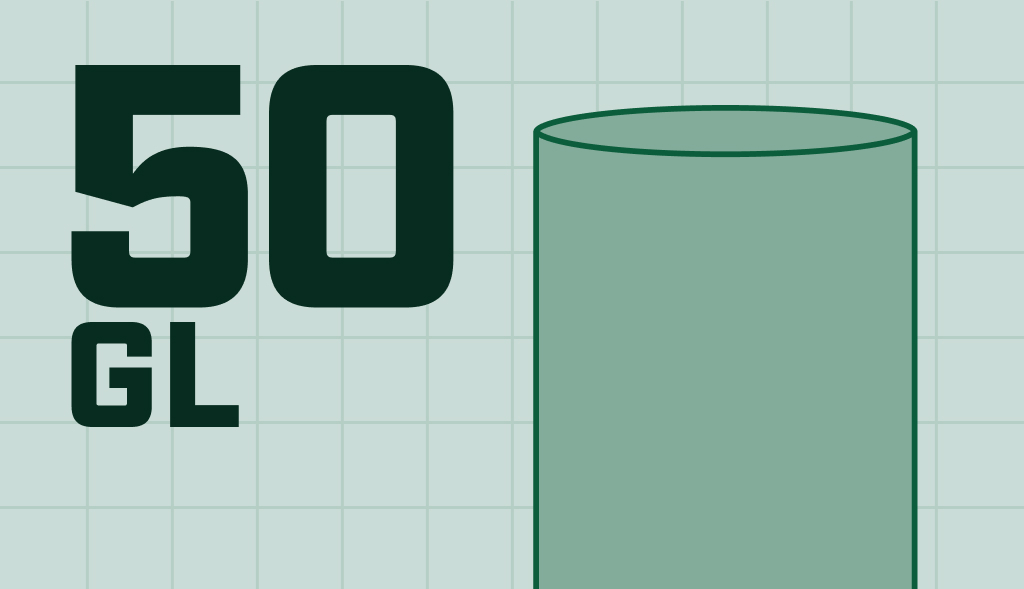A Detailed Look at the 50 Gallon Water Heater

Whether you’re installing a water heater in a new home or replacing an older model, choosing the right size and type is important. For medium to large-sized households, a 50-gallon water heater often fits the bill. But should you go for a natural gas or an electric model?
In this article, we’ll delve into the specifics of both gas and electric 50-gallon water heaters, and how to choose between them to buy the best water heater for your house.
The Basics of 50-Gallon Water Heaters
A 50-gallon water heater is a common size for tank water heaters, suitable for a family of 3-5 people. It ensures a steady supply of hot water for multiple showers, dishwashing, and laundry. But when choosing a model of 50 gallons capacity, you’ll need to decide between a gas tank water heater and an electric water heater.
Natural Gas 50-Gallon Water Heaters
Natural gas water heaters heat water using a gas burner located at the bottom of the tank. The hot combustion gasses warm the water and then exit through a vent pipe. One of the most significant advantages of gas water heaters is their fast recovery rate. This means they can heat a new tank of water faster than electric models.
Gas water heaters are typically cheaper to operate due to lower gas costs compared to electricity. However, they require venting, a gas line, and regular maintenance to ensure safe operation.
Electric 50-Gallon Water Heaters
Electric water heaters use electric resistance coils to heat the water. They are typically less expensive to purchase and install than gas models. Electric models don’t require venting, making them more flexible in terms of installation.
Electric water heaters usually have a slower recovery rate than gas models. They can still adequately provide for the hot water demands of a medium-sized family.
Key Considerations for Choosing a 50-Gallon Water Heater
When choosing between a gas or electric 50-gallon water heater, there are several factors to consider.
Energy Efficiency
Electric water heaters are generally more energy-efficient than natural gas models because they don’t lose heat through venting. However, due to higher electricity costs, they may be more expensive to operate. Always check the Energy Factor (EF) rating; the higher the EF, the more energy-efficient the heater.
Installation Requirements
Installation requirements can differ significantly between natural gas and electric water heaters. Gas models require venting and a gas line, which can add to the installation cost if not already in place. Electric models need an adequate electrical circuit.
Costs
While gas water heaters usually have a higher upfront cost than electric models, they often have lower operating costs. When considering the price, make sure to factor in both the purchase price and the estimated annual operating cost.
Purchasing a 50-Gallon Water Heater
Depending if you’re leaning towards a natural gas or electric 50-gallon water heater, most local stores offer a range of models to suit different budgets and needs.
Customer service representatives should be able to guide you through the selection process. They should take into account your hot water usage, installation requirements, and budget.
After-Sales Service
Good customer service doesn’t stop after the sale. Ensure the brand you choose offers solid after-sales support. This includes a strong warranty and a responsive service department for any maintenance or repair needs.
Extending the Life of Your New 50-Gallon Water Heater
Proper maintenance and the use of quality accessories can significantly extend the life of your 50-gallon water heater. One such accessory is the Corro-Protec powered anode rod. Traditional sacrificial anode rods can deteriorate over time, which can cause the tank to rust and lead to water heater failure.
However, a Corro-Protec powered anode rod is different. It uses an electrical current to stop the corrosion process, effectively protecting the tank without deteriorating itself.
By reducing corrosion, the Corro-Protec rod can extend the life of your water heater, prevent foul-smelling water caused by a corroded anode, and save you money in the long run.
This is a smart investment for anyone wishing to maximize the lifespan of their new 50-gallon water heater.
Renting
The decision to rent or buy depends not only on your needs, but also on your expectations. Renting offers a unique turnkey service, while buying represents a worthwhile investment. To find the best option for you, simply compare suppliers, budget, maintenance costs, assistance, insurance premiums and risk assessments. It may seem a lot to consider but it might be a short-term option.
Conclusion
Choosing the right 50-gallon water heater for your home involves considering your hot water needs, energy efficiency, costs, and installation requirements. Whether you go for a natural gas or electric model, your new water heater should provide ample hot water for your family’s needs.
Make sure to shop around, compare models and prices at your local store, and consider the quality of customer service before making your final decision.
Blog
Tank vs Tankless Water Heater: Which Is the Best Water Heater for You?
You need hot water for everything from doing laundry and dishes to enjoying a nice bath or shower at the end of a long day. […]
Choosing the Best Water Heater for Your Home
Investing in the best water heater for your home that suits your specific needs is crucial. Water heaters come in different types, including gas water […]

